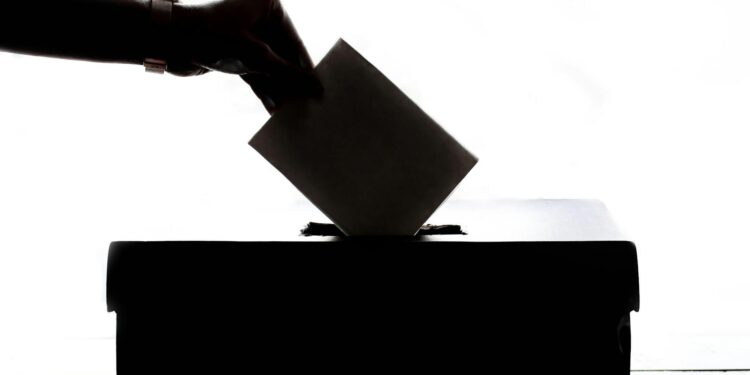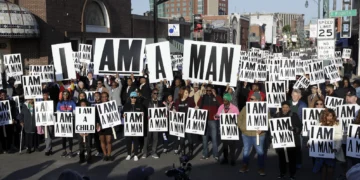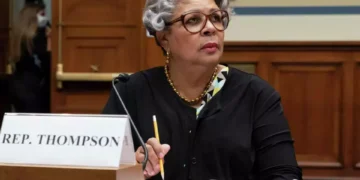March 21, 2025 Story by: Editor
The relationship between Black Americans and the Republican Party has been a topic of growing interest in recent years. Conversations have focused on issues such as the higher voting rate among Black men for Donald Trump compared to Black women in the 2020 presidential election, as well as the influence of Black pop culture on GOP-aligned candidates in both national and local politics.
While the political leanings of Black adults in the U.S. have remained relatively consistent over the decades, there was a significant shift in the mid-20th century. During the 1930s, Black adults were equally likely to support either the Republican or Democratic Party.
However, the number of Black Americans identifying with the GOP started to decline in the 1940s, particularly following President Harry S. Truman’s executive order to desegregate the U.S. military in 1948. This trend solidified after the Civil Rights Act was passed under Democratic President Lyndon Johnson in 1964.
Today, only about one in ten Black adults identify with or lean toward the Republican Party. A Pew Research Center survey conducted in October found that just 4% of Black registered voters intended to vote for the Republican candidate for the U.S. House seat in their district, while 69% supported the Democratic candidate.
On matters of race, Black Republicans and Black Democrats diverge in a key area: their approach to addressing racial inequality. Black Republicans tend to advocate for individualistic solutions, whereas Black Democrats generally favor institutional reforms.
For instance, Black Republicans and those who lean toward the GOP are more likely than Black Democrats and Democratic-leaning individuals (59% vs. 41%) to believe that the primary issue for Black people is racism from individuals rather than systemic discrimination embedded in laws. Additionally, Black Republicans are less likely than Black Democrats to endorse sweeping institutional reforms in the prison system (35% vs. 57%), policing (29% vs. 52%), and the judicial process (35% vs. 50%) to ensure fair treatment of Black people.
Black Republicans tend to be younger than both Black Democrats and white Republicans. Approximately three in ten Black Republicans (28%) are between the ages of 18 and 29, which is higher than the percentage among Black Democrats (17%) and white Republicans (10%). Conversely, only 9% of Black Republicans are 65 or older, compared to 18% of Black Democrats and 28% of white Republicans.
Regarding income levels, Black Republicans and Black Democrats have similar economic profiles. They are nearly equally likely to live in upper-income (12% vs. 10%) or middle-income households (37% vs. 40%). About half of both groups reside in lower-income households. However, Black Republicans are significantly more likely than white Republicans (50% vs. 18%) to be in lower-income brackets.
Geographically, about half of Black Republicans live in the South, a trend that mirrors Black Democrats. Around 52% of Black Republicans reside in Southern states, compared to 56% of Black Democrats. However, Black Republicans are more likely than white Republicans (38%) to live in the South. They are also less likely than white Republicans to reside in the Midwest (17% vs. 27%) or the West (13% vs. 20%).
When it comes to religious affiliation, Black Republicans are less likely than Black Democrats to attend predominantly Black Protestant churches. Although most Black adults in both parties identify as Protestant, only 22% of Black Republicans regularly attend Black churches, compared to 34% of Black Democrats. The percentage of Black Republicans and Black Democrats who are Catholic is the same (6%), as is the proportion of those who are religiously unaffiliated (24% vs. 21%).
Black Republicans are less likely than Black Democrats to consider Black identity a significant part of their personal identity. While 58% of Black Republicans say being Black is an extremely or very important part of their self-perception, the percentage is notably higher among Black Democrats at 82%. Additionally, Black Republicans are more likely than Black Democrats (21% vs. 6%) to say that their racial identity is only slightly or not at all important to their self-perception.
However, Black Republicans and Black Democrats view their ancestry as equally important to their personal identity. Around 66% of Black Republicans and 65% of Black Democrats consider their ancestry an extremely or very important part of who they are. Both groups are also equally likely to be aware that their ancestors were enslaved (54% vs. 59%) and to discuss their family history with relatives (78% vs. 77%).
Black Republicans express a weaker sense of “linked fate” with other Black people in the U.S. compared to Black Democrats. About 39% of Black Republicans believe that most or all events affecting Black Americans will have a direct impact on their own lives, whereas a larger share of Black Democrats (57%) hold this belief.
Despite their differing political affiliations, Black Republicans and Black Democrats report similar levels of discrimination. Approximately 79% of Black Republicans say they have personally experienced racial or ethnic discrimination, with 20% stating it occurs regularly and 59% saying it happens from time to time. The numbers are nearly identical for Black Democrats, with 80% reporting similar experiences.
Although both groups encounter discrimination at similar rates, they perceive its impact on progress differently. Black Republicans are less likely than Black Democrats (44% vs. 73%) to believe that racial discrimination is the primary reason Black people struggle to advance in the U.S. Instead, they are more inclined to think that individuals are largely responsible for their own circumstances (45% vs. 21%).
When it comes to optimism about racial equality, Black Republicans and Black Democrats share similar levels of skepticism. Around 39% of Black Republicans and 45% of Black Democrats believe that achieving racial equality in the U.S. is unlikely. In both groups, only about 15% believe that racial equality is extremely or very likely in the future.
Source: Spokesman Recorder

















